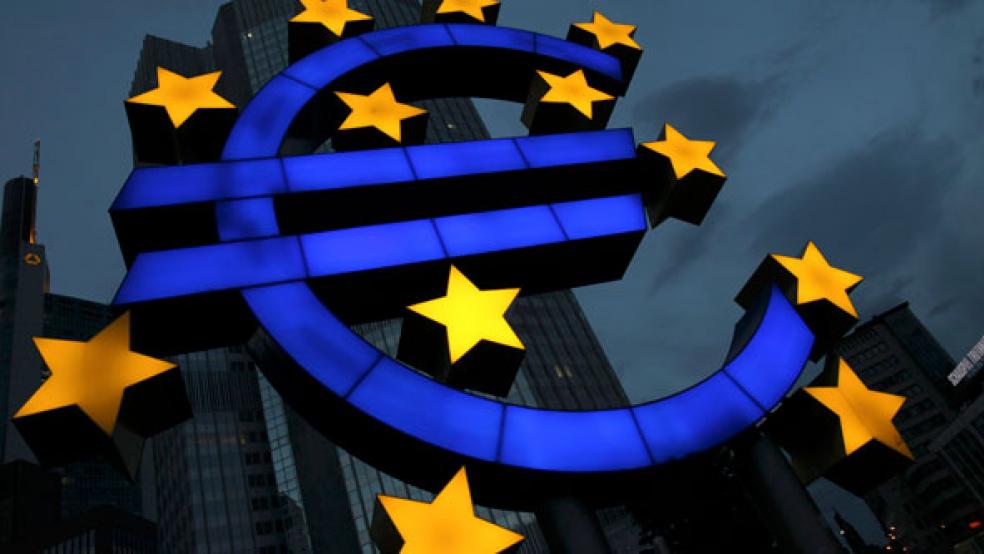If the questions surrounding the future of Eurozone monetary policy and regulation still have plenty of questions swirling around them, the same is true of investing in Europe.

European markets have done well, even on the periphery, since ECB head Mario Draghi drew his line in the sand last July by declaring he would do “whatever it takes” to preserve the single currency. MSCI may have downgraded Greece to emerging-market status this week, but the MSCI Greece index is up 42 percent over the last 52 weeks. The MSCI France Index is up more than 30 percent. Spanish, German and Italian markets have fared similarly well.
But as Asoka Woehrmann, co-chief investment officer at Deutsche Asset & Wealth Management, reminded his listeners at a speech this week, central bank involvement in financial markets globally has had side-effects: Markets have shifted from earning “risk-free returns,” he said, to facing “return-free risk.”
It all boils down to which kind of risk you prefer to take, Woehrmann suggests. “Owning (the Eurozone) periphery is risky; not owning it is painful,” he said, referring to countries such as Spain, Italy and Greece. By staying on the sidelines, an investor risks losing out on future upside, even while betting heavily that such ferocious headwinds as youth unemployment levels of nearly 50 percent won’t permanently derail growth in countries such as Spain.
So, what’s an investor to do if he or she wants to capture any further bounce off the bottom on the part of European markets? Henning Gebhardt, head of EMEA equities at Deutsche Asset & Wealth Management, says one important consideration is for an investor to monitor what is happening to the policy framework. New approaches to establishing monetary policy need to be developed, to address the fact that economic fundamentals in different parts of the still-expanding Eurozone (Latvia is hoping to join soon) don’t deliver the wrong signals.
“The policy framework once was too accommodative for Spain, and too restrictive for Germany; now it may be that it is the reverse,” Gebhardt says, pointing, as evidence, to the booming German real estate market. Investors in Europe also need to keep tabs on the pace and shape of reforms designed to make the labor market more flexible (and encourage mobility throughout the Eurozone.)
For now, at least – with the ECB still pondering its next move, and the future shape of regulation still unclear, but with the region’s fiscal crisis in “pause” mode – Gebhardt sees the investment opportunities in Europe divided into two categories: one for opportunities tied to global growth and one for those dependent on a local or regional rebound.
In Gebhardt’s view, the logical place for investors to focus their collective attention is in stocks whose returns will be tied to the global economy rather than those of companies whose returns will be dependent on what happens within the Eurozone itself. “There is a long list of these companies in Europe with extremely strong balance sheets and above average growth, because it is coming from around the world, and they are not too pricey,” says Gebhardt. While he doesn’t recommend any specific securities, the kinds of companies he is talking about are those like BMW, Nestlé (which also has been aggressively boosting its dividend), aerospace industry suppliers and even some machinery companies. “In a way, the Euro crisis pushed them to focus more on global growth,” Gebhardt adds.
While this policy-driven world may be best suited to those investors willing to invest the time and energy required to be stock pickers, Gebhardt suggests that to some extent, individual national markets also reflect this divergence between relying on global growth versus European regional growth. “Among German companies, 75 percent of earnings growth is export driven,” Gebhardt says. In contrast, he notes that 75 percent of the Spanish market is tied to the domestic or regional economy.
As Woerhmann pointed out, the decision not to invest in the Eurozone’s periphery – in markets like Spain or Italy – is a risky one.
But bargain hunting, Gebhardt says, “can be a dangerous game,” since many of these markets are dominated by financial stocks (still struggling with loan loss provisions and facing the need to raise new rounds of capital) as well as retailers and real estate companies, which have their own balance sheet woes. In contrast, owning a stable, global-oriented company like Siemens, which, although its earnings have suffered during periodic cyclical downturns, has never once cut its dividend to shareholders in the postwar period, may look like an easier call, and be less likely to require doses of Pepto Bismol in the coming months – especially since, as Gebhardt notes, “quality is not trading at a historical premium within Europe these days.”






